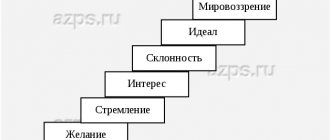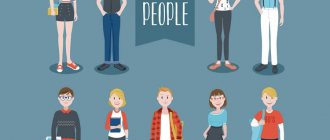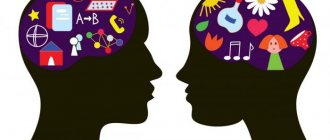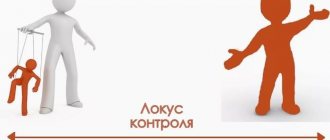Negative qualities of a person contain, oddly enough, positive tendencies, which are their basis, root, and if these positive tendencies are developed, this leads to a harmonious and happy life.
Man is basically good, and any bad character traits he has are not his true nature. In other words, the initial positive aspirations and inclinations of a person, under the influence of various circumstances of the material world (environment), can be distorted, transforming over time into negative qualities. And this transformation, of course, is reversible.
We can say that various negative tendencies of a person (for example, drinking, smoking, gossiping, bragging, etc.) are a kind of substitutes for the good qualities that the person previously had.
In this article we will look at some negative character traits along with the positive tendencies they contain, which will allow us to analyze ourselves (and others), identify our good tendencies and aspirations, and then develop them, and thus improve our lives.
Any negative trend listed below is an incorrect use of soul energy, which, naturally, causes no less negative consequences. However, there is no need to fight bad qualities, they do not need to be suppressed, you just need to change the direction of your efforts. You can’t just stop the flow of energy, but it can be redirected where we need it. This is similar to how it is impossible to stop a river, no matter what dam we build, but we can turn the river into another channel that we need. Often a person tries to fight negative character traits by suppressing them, and for a while this may work, but then the dam breaks, which brings even more destruction. Therefore, there is only one reasonable solution - to transform the energy, change the vector of movement, and this article will help you understand how to do this.
Definition
Inclination in psychology is a concept that explains a person’s orientation towards a particular activity. The definition is closely related to a set of personality properties - abilities.
An ability is a characteristic of a person whose traits relate to the condition for successfully performing a specific task. It develops thanks to the initial inclinations in the process of work, to a greater extent - educational. Does not correlate with existing properties: knowledge, skills or abilities.
Question about the understanding of the term
S. Rubinstein interprets the concept as a professional orientation, while A. Kovalev talks about the need for a certain type of activity. Personal psychology specialist K. Platonov identifies the concept as one of the many manifestations of a social orientation.
A. Orlov believes that inclination is a term that does not indicate any work, but only the one by which a person is motivated. That is, in the case when pleasure is brought not only by achieving the goal, but also by its very implementation.
The set of patterns responsible for abilities are determined due to the depth, simplicity, and stability of mastering the techniques and skills of a certain type of activity. All of them belong to the primary regulators within the psyche, and they differ in the possibility of acquisition and development.
Inclination in psychology is a concept that, along with abilities, resources and inclinations, are included in a specific area of mental phenomena of an individual, which in turn is associated with the provision and development of any kind of activity.
Often, the propensity for a particular action or skill is directly related to the presence of abilities, but there have been examples of discrepancies in psychiatric practice.
Thus, depending on the strength of a child’s involvement in a certain type of work, his abilities for this activity develop to a greater extent. In this case, the inclination is supported, first of all, by the success of completing the task.
Intellectual abilities
Inclinations towards history, physics, biology or chemistry usually appear in adolescence. The following evidence indicates a child’s possible talent for science:
- curiosity;
- excellent memory;
- interest in learning;
- observation;
- the ability to concentrate on intellectual pursuits for a long time;
- attempts to conduct their own experiments, experiments;
- love of reading encyclopedias;
- passion for puzzles, riddles that challenge intelligence and logic.
The child’s abilities are just beginning to form, so it is important to guide their development along the right path.
A future scientist requires not only deep knowledge in a certain field, but also the ability to creatively work with information, formulate problematic problems, and independently find their solution. To develop mental activity, invite your child to solve interesting tasks that require careful analysis of the situation and flexibility of thinking. Play games that develop voluntary attention, teach you to make predictions, and come up with effective strategies.
Varieties
Since the development of interest in a particular task or activity is expressed in the presence of preferences or their appearance that correspond to a particular area of interest, inclinations differ according to subject or cultural characteristics:
- Humanities. Language learning, literature, musical taste, theater or cinematography, choreography, fine arts.
- Natural and natural. Medicine, ecology, geography, physics, chemistry.
- Social science. Psychology, economics and law, politics, society, history.
- Technocratic. Mechanics, electrical engineering and construction, energy, communications.
The list of varieties of inclinations towards a certain subject can continue endlessly, since it is not limited by anything except the individual’s interest itself.
The following classification is based on the degree of manifestation:
- Amorphous. Unclear or unstable inclinations.
- Situational. They appear only when certain specific conditions are present.
- Sustainable. Addressed simultaneously to several areas of application.
- Local. Used within a specific area.
- Dominant-absorbing. They are inclinations that subordinate all forms of personal character.
Based on the psychological classification, in practice there are:
- Cognitive. They are a selective type of orientation, which is addressed, first of all, to accurate knowledge of the subject, including its content and the process of formation of new knowledge.
- Aesthetic. A special type of inclinations that are expressed in a selective preference for objects or areas associated with the presence of beauty in the world - natural forms, artificial structures, melodic movement.
- Moral. Characterized by the expression of a special understanding and heightened sensitivity to the presence of moral values.
- Practical or actionable. They represent a collection of all psychological classifications that are closely related to each other. They differ in their mental-cognitive, aesthetic-moral and emotional choice of sphere.
Based on the pedagogical practice of teaching, the interests of each individual are used as:
- motivation to learn.
- intensification of personality development.
- education of moral and ethical qualities.
- stimulating the learning process.
Addiction in psychology is a definition that is often used to reduce the negative aspects of retardation in children. With the right approach and the presence of a professional specialist in the field of psychology, this will be a good means of educating an adult personality.
A concrete example pointing out the difference in classification is that for a mathematician it is not at all enough to have only memory or attention. Individuals who were better than others in mathematics education were distinguished by a tendency to find an order within which certain elements needed for scientific proof were located.
Makings of an artist
Children's creative abilities manifest themselves earlier than others. Future artists from 3-5 years old:
- spend a long time and enjoy drawing, modeling, and appliqué;
- convey the characteristic features of an object or character through the material used;
- do not need templates, discover new techniques and techniques without prompting;
- they notice the beauty around them, admire the rainbow, sparkling snow, and enjoy looking at paintings in museums;
- they make applied crafts that can decorate the interior of a room or be used to create a stylish look (beads, bracelets).
It is important to involve such children in joint creativity and organize home exhibitions. Be sure to visit the Museum of Fine Arts and show your child reproductions of famous paintings. Pay his attention to how the artist achieved the desired effect with the help of certain colors or strokes.
Characteristics and properties
The basis of any inclination is the so-called inclinations - primary, biological characteristics of the psyche that a person receives from birth and matures with him.
Characteristics of the root causes of such inclinations include anatomical and physiological features:
- musculoskeletal system;
- neurodynamic structure of the brain;
- asymmetrical specificity of both hemispheres;
- sense organs.
Individual characteristics of inclinations act as biological characteristics that shape a person’s personality. At the same time, they can turn into abilities, not always guaranteeing their direct development, which correlates with the quality of education and the chosen activity.
The founder of the school of differential psychiatry, Honored Worker of the Scientific Department of the RSFSR, Professor B. Teplov in one of his works described some properties of inclinations. According to the author, individual abilities cannot be innate, in contrast to the inclinations, which he perceived as anatomically determined features.
Musical gift
Sometimes its manifestations can be noticed in a one-year-old baby. Future composers and performers:
- react emotionally to music, move to the beat;
- recognize a song by its first notes;
- easily reproduce the melody they hear;
- they compose simple songs themselves;
- love to play with musical instruments.
If your child exhibits these qualities, introduce him to classical music. Go to a concert, opera, or watch a children's ballet together. Buy musical toys. When your baby grows up, install music creation programs on your computer. And, of course, take your child to music school.
Functions and role
Inclination in psychology is a concept that is a motivational element of activity. Therefore, without their presence, this or that activity may not begin, bypassing the formation of any ability in a person’s personality. On the other hand, in the absence of a successfully completed action, the individual’s inclinations cannot be objectified.
The other side of the inclination, which characterizes it as the main message to action, is giftedness. The term is complex and is associated primarily with the individual’s performance of a specific task. Simply put, giftedness includes various inclinations and abilities, the quantification of which determines success.
The coefficients of intelligence and aptitude, although different from each other, are, however, connected due to the general concept of mental abilities. Unlike the standard IQ model, aptitude refers to multiple mental characteristics that are independent of each other.
This approach is paramount in the study of human psychology, similar to the well-known theory of differential intelligence, as well as the Cattell-Horn hypothesis.
Also, inclinations have found their application in the study of the actions of criminals. Thus, using cognitive tricks in practice, it is possible not only to identify the psychological profile of the killer, but also to create an overall picture that will allow one to predict his further actions. Clinical criminology and the psychological theory of crime are responsible for this.
Makings of a leader
A child's organizational abilities become evident during middle school age. Before this, we can talk about them conditionally, since children are still learning to communicate, interact with the team, and make friends. A true leader is not one who wants to be first and command everyone. This is a person who is ready to take responsibility for other people, inspire them and lead them.
You can talk about the presence of leadership inclinations in a child if he:
- independent;
- quickly adapts to an unfamiliar situation;
- communicates confidently with strangers, both children and adults;
- is popular with peers;
- likes to lead others;
- can captivate friends with your favorite game;
- knows how to persuade without using his fists;
- is interested in the feelings and motives of behavior of the people around him.
Parents of such children should give them the opportunity to make their own decisions and choices. A leader must understand from childhood what a mistake is fraught with and how it can be corrected. Assign your child responsible tasks and praise him for his initiative. In a conflict situation, look for a compromise together. Be sure to instill the right moral values in your son or daughter. After all, he will have to become an example for others.
Forms of manifestations
Most significantly, abilities and inclinations manifest themselves in the learning process, including the relearning of already acquired information. They also find their development in non-standard situations or environments.
Tendencies are manifested not in abilities, skills, or knowledge, but in the presence of dynamic execution and acquisition, that is, in how quickly and easily the subject is acquired by an individual under equal conditions. In this vein, aptitudes or abilities are just some opportunity that will allow one to acquire the necessary skills or knowledge.
For example, they do not talk about abilities when applying them to drawing techniques, since a person does not yet have the necessary knowledge or skills. Only in the process of learning to draw, including human anatomy, the ability to distinguish one type of painting from another, etc., can one determine whether an individual has a predisposition - how easily and simply he learns the technique.
The form of manifestation can also be found by studying a person under equal conditions. In the event that he does not cope with the given requirements, this will indicate a lack of inclination. Based on this, an individual will be able to learn the desired activity, but at the same time it will involve much more tension and effort.
Tendencies, like any other phenomena in psychology, have a qualitative and quantitative definition. Only by comparing this concept can we talk about a person’s ability for a particular subject. Any comparison should be made only within the framework of equality of external conditions.
Technical aptitude
You can notice them in older preschool age. Such children:
- prefer to play with cars and construction sets;
- assemble new models from available parts;
- They often draw transport and equipment;
- trying to “fix” something on their own;
- love to help their father with repair work;
- disassemble toys and devices to understand how they are made.
Developing abilities in children sometimes requires sacrifice. This is exactly the case. To protect home appliances from a young researcher, buy a children's workshop, donate a broken phone and enroll your child in a technical club from the 1st grade.
Psychological theories and schools
In addition to the fundamental theories about inclinations as an element formed from birth, there are several other opinions in psychological practice that develop the topic of abilities in more detail.
Law of limitation and compensation of abilities and needs
The law of compensation and limitations of abilities or inclinations was derived by psychologist N.D. Margaryan, the formulation of which is as follows: “Compensation for limited inclinations by other individuals is possible only if absolutely all qualitative properties coincide at the same time, with discrepancies in quantitative affiliation.”
The author of the law derived the following 4 signs:
- The deficiency in the attitude of both individuals towards each other, whose inclinations coincide in quality, is determined by the possibility of their incomplete compensation.
- The redundancy of relationships between two people with equal quality of needs or abilities is characterized by limitations in their actualization.
- The excess of inclinations, as well as their deficiency in relation to needs, is compensated with the help of evaluative and qualitative actualization.
- The insufficiency of inclinations with the simultaneous excess of equivalent needs is compensated based on the actualization of qualitatively distinctive abilities.
The law can also be described in another version: “only inclinations that are equal in terms of qualitative characteristics of each other can be compensated or limited. Quantitative ones always diverge.”
Model V.D. Shadrikova
Soviet and Russian psychologist V.D. Shadrikov developed a specialized representation of individual inclinations, which differs in composition, level of implementation, and mechanism of action.
Model of propensities according to Shadrikov, depending on the type of mechanisms:
| Type of mechanism | Description and impact |
| Functional | This includes the level of abilities of each individual, which is determined using the ontogenetic evolutionary model. |
| Operating | They differ in the quality of characteristics of an individual’s abilities for any activity. They are formed and developed at an early age with upbringing and education. Operating mechanisms are a system of developmental operations and mental actions that are aimed at solving problems. |
| Regulatory | They are formed as subjects who manage their own inclinations. They are implemented in the form of external regulatory action (attitudes, motives, interests). Regulatory processes reproduce meta-intellectual functions, which in turn creates metacognitive mental processes. |
Developing abilities with the help of inclinations, the psychologist identified 5 main branches:
- Development and improvement of functional subsystems that implement certain mental functions of the brain;
- Teaching intellectual operations or creating special cognitive mechanisms;
- The ability to manage one’s own inclinations;
- The presence of inclinations characteristic features of operational actions, including adaptability.
- Setting inclinations to control them using moral personality traits.
For meta-intellectual processes, Shadrikov identifies such mental operations as decision-making and planning, semantic programming, control actions, self-reflection, etc.
Artistic data
Many great actors in early childhood enjoyed reading poetry while perched on a stool. This path is close to your baby if he:
- loves speaking in front of an audience;
- very emotional;
- gestures expressively;
- imitates favorite characters, parodies their movements, behavior, voice;
- when talking about something, he tries to evoke a certain reaction in the listener.
The creative abilities of preschool children manifest themselves clearly in only 10-15% of cases. Perhaps your child is trying himself in different areas. The task of parents is to take care of the harmonious development of the baby. Getting acquainted with classical music, modeling and drawing classes, staging home performances, visiting the theater for young spectators - all this should be present in the complex.
Management methods
Before you begin to manage your inclinations, you should evaluate the acquired skills using so-called achievement testing. Such a test can assess various psychological constructs.
One example of such tests is the US Vocational Training Battery, which analyzes the neuropsychiatric factors of US Army recruits.
Another example is the SAT, a testing method that was developed specifically to study students in US schools and colleges. Unlike most forms, this test uses elements of achievement.
Tests to determine abilities are conventionally divided into several types, based on the presence of cognitive processes.
In practice, flexible intelligence is distinguished - the ability to reason and think in abstract projections, strategically, effectively solve most problems, as well as crystallized intelligence - learning important lessons from previous experience, applying knowledge in new situations.
From the point of view of the impact on the individual, in practice, subject-matter management psychology is used - a branch of science that takes into account psychological and cognitive patterns aimed at management activities. The main task of such psychology is to analyze certain conditions for the development of efficiency within a certain system.
The psychology of propensity control relies on methods such as experiment and observation. In this case, the main subjects are personality and its improvement, managerial effectiveness, as well as the regulation and study of actions in groups or teams.
Psychologist E.A. Klimov presented many classifications of management activities using human abilities. One of the most popular is systematic actions according to the parameters of psychophysiology, in which there are systems:
- "Man-nature";
- "Man-Technology";
- "Man-man";
- “Man-familiar system”;
- “Man is an aesthetic or artistic image”
All elements of algorithmic structures, one way or another, are based on the theory of the influence of inclinations on the professional activity of an individual, including his social behavior within the framework of a working society.
Thanks to his inclinations and abilities, a person can make significant progress in improving his own personality. Such use of techniques with the help of psychology specialists can indirectly influence many personal properties, such as vital activity, intelligence, resilience and much more. This will also make the learning process easier and create a more comfortable work environment.











